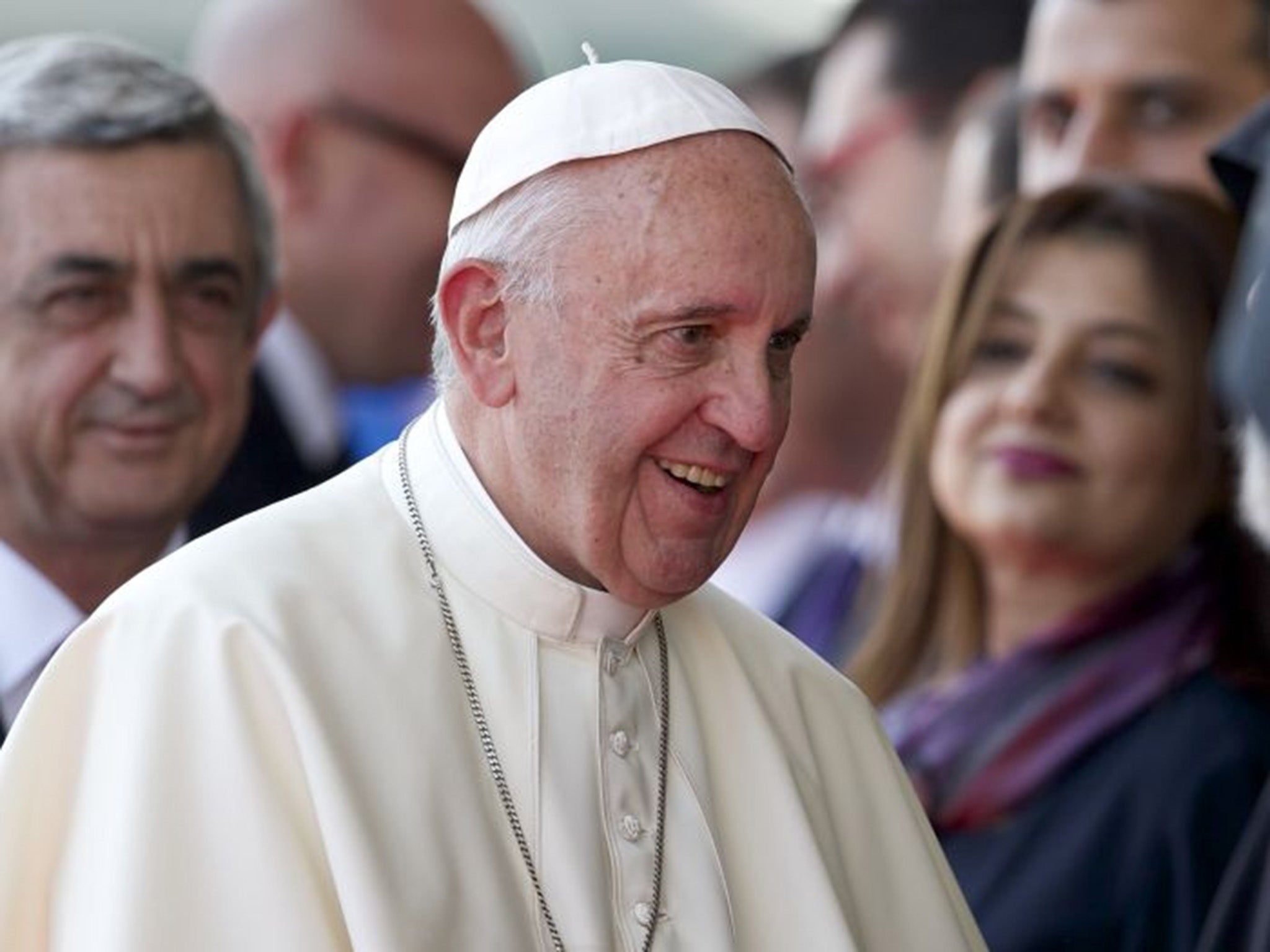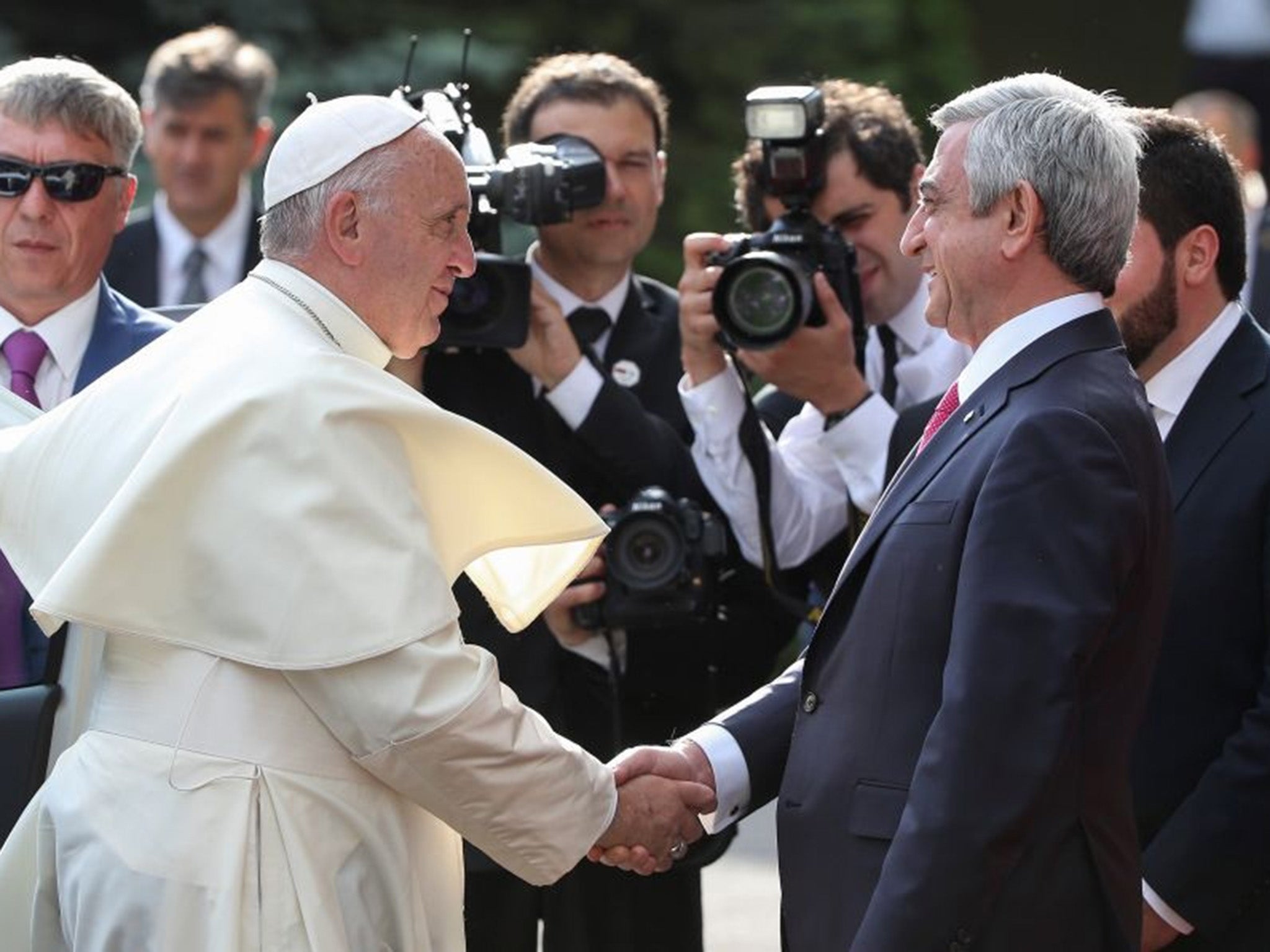Pope Francis uses the term 'genocide' to describe Armenian massacre during visit to memorial
Pontiff veers off prepared speech to directly refer to the massacre as a genocide

Your support helps us to tell the story
From reproductive rights to climate change to Big Tech, The Independent is on the ground when the story is developing. Whether it's investigating the financials of Elon Musk's pro-Trump PAC or producing our latest documentary, 'The A Word', which shines a light on the American women fighting for reproductive rights, we know how important it is to parse out the facts from the messaging.
At such a critical moment in US history, we need reporters on the ground. Your donation allows us to keep sending journalists to speak to both sides of the story.
The Independent is trusted by Americans across the entire political spectrum. And unlike many other quality news outlets, we choose not to lock Americans out of our reporting and analysis with paywalls. We believe quality journalism should be available to everyone, paid for by those who can afford it.
Your support makes all the difference.Pope Francis denounced what he called the ideologically twisted and planned "genocide" of Armenians by Ottoman-era Turks a century ago as he arrived in Armenia on Friday for a deeply symbolic visit to mark the centenary of the massacre and pay homage to the country's steadfast Christian faith.
In the most carefully watched speech of his three-day trip, Francis ad-libbed the politically charged word "genocide" to his prepared text that had conspicuously left it out, listing the Armenian genocide alongside the Holocaust and Stalinism.
And rather than merely repeat what had said last year — that the slaughter was "considered the first genocide of the 20th century" — Francis declared it a genocide flat out, setting the stage for another Turkish protest after it withdrew its ambassador last year and accused Francis of spreading lies.
"Sadly that tragedy, that genocide, was the first of the deplorable series of catastrophes of the past century, made possible by twisted racial, ideological or religious aims that darkened the minds of the tormentors even to the point of planning the annihilation of entire peoples," he said.
"It's so sad how, in this case and in the other two, the great international powers looked the other way," he added, referring to the subsequent horrors of Nazism and Stalinism.
In the run-up to the visit, the Vatican had refrained from using the term "genocide," mindful of Turkish opposition to the political and financial implications of the word given Armenian claims for reparations.
But Francis, never one to shy from speaking his mind, added the word at the last minute in a speech at the presidential palace to President Serzh Sargsyan, Armenian political and religious leaders and the diplomatic corps.
They gave him a standing ovation.
"One cannot but believe in the triumph of justice when in 100 years ... the message of justice is being conveyed to mankind from the heart of the Catholic world," marveled President Sargsyn in his speech to the pope.

Many historians consider the massacres of an estimated 1.5 million Armenians genocide. Turkey rejects the term, says the death figure is inflated and that people died on both sides as the Ottoman Empire collapsed amid World War I.
The Vatican spokesman, the Rev. Federico Lombardi, said Francis always speaks of the need for reconciliation and that his declaration of a genocide must be taken in the context of recognizing a past horror to then move on in friendship and reconciliation. Lombardi denied that the Vatican's diplomatic speechwriters had intentionally left the word out, saying they had intentionally left it up to the pope to decide what to say.
In a largely Orthodox land where Catholics are a minority, Armenians have been genuinely honored to welcome a pope who has long championed the Armenian cause from his time as an archbishop in Argentina and now as leader of the 1.2-billion strong Catholic Church. His 2015 declaration that the massacres were considered a "genocide" sealed their affection for him.
"I shook the pope's hand but didn't have the time to kiss it," 42-year-old Yerevan resident Nazik Sargsyan said Friday as Francis arrived. "I'm sure God's blessing has come down on me with that handshake."
Small groups of residents lined his motorcade route, and a gaggle of schoolchildren wearing white T-shirts and yellow neckerchiefs — the colors of the Vatican flag — greeted him at the airport with a big banner written in Italian: "Armenia Welcomes Pope Francis."
In his initial remarks upon arrival in the ornate Armenian Apostolic Church in Etchmiadzin, Francis praised Armenia for becoming the first nation to declare Christianity the state religion in 301 and for keeping alive the "light of faith" even in its darkest times.
With the Apostolic patriarch Karekin II by his side, Francis urged all Christians to unite to prevent religion from being exploited and manipulated today, a reference to the current-day Islamic extremist attacks on Christians in the Middle East.
"It is vitally important that all those who declare their faith in God join forces to isolate those who use religion to promote war, oppression and violent persecution, exploiting and manipulating the holy name of God," he said.
The Vatican has long cheered the Armenian cause, holding up the poor nation of three million mostly Orthodox Christians as a bastion of faith and martyrdom in a largely Muslim region.
President Sargsyan, Karekin and a few other officials greeted Francis at the Yerevan airport in a low-key welcome ceremony. A girls' choir serenaded and the pope, patriarch and president then walked behind a goose-stepping military official along a red carpet into the airport's VIP lounge before heading to Echmiadzin, the seat of the Oriental Orthodox church where Francis will stay as a guest of Karekin.
"Blessed is the hour when the feet of Pope Francis touched our soil!" exclaimed local resident Simon Samsonya as Francis arrived. "He won the love of the Armenian people with his message at the St. Peter's Cathedral on the eve of the 100 years anniversary of the genocide."
Francis will have another opportunity to pay respects to the victims of the slaughter when he visits Armenia's genocide memorial on Saturday. He caps his visit Sunday with a visit to a monastery on the border with Turkey. There, he will free a dove of peace in the direction of Mt. Ararat, the mythological landing place of Noah's Ark and a place of sacred importance to Armenians.
AP
Join our commenting forum
Join thought-provoking conversations, follow other Independent readers and see their replies
Comments